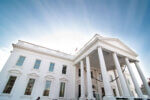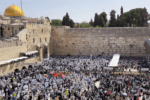As we recently celebrated Pentecost Sunday, we were reminded that God is still pouring out His Spirit as He did on the first-century church. The term “Pentecost” is found three times in the Bible (Acts 2:1, 20:16; 1 Cor. 16:8) and refers to a specific feast and holiday on the Jewish calendar. The word “Pentecost” means “50” because it occurred 50 days after Passover. (Now it falls on the seventh Sunday after Easter.) To fully understand Pentecost, we must study God’s manifestation on Mt. Sinai (Ex. 19). Pentecost was a feast instituted by God to commemorate the giving of the Law. It’s also called the “feast of weeks” and “feast of harvest” (Ex. 23:14-16; Lev. 23:15-21; Deut. 16:9-12). The first Pentecost occurred when God consumed Mount Sinai with fire and thundered His Ten Commandments to Israel. Incidentally, when God spoke to a man (Moses), He lit a bush on fire; when He spoke to a nation (Israel), He lit a mountain on fire! “For our God is a consuming fire” (Heb. 12:29).
In the New Testament sense, Pentecost was the birthday of the church, the day the Holy Spirit was given to 120 believers in the upper room. This resulted from a week-long prayer meeting. “He commanded them not to depart from Jerusalem, but to wait for the promise of the Father … for John truly baptized with water, but you shall be baptized with the Holy Spirit not many days from now” (Acts 1:4-5). Jesus’ crucifixion corresponded closely with Passover and, after His resurrection, He appeared to His followers for 40 days before His ascension (Acts 1:3). That left about seven or eight days before Pentecost arrived. “And when the day of Pentecost had come … they were all filled with the Holy Spirit and began to speak in other tongues, as the Spirit enabled them to speak” (Acts 2:1, 4). The word “filled” here means “to saturate, penetrate or permeate as with a stain or a dye.” When you stain wood, it penetrates the surface and seeps down into the wood. When you dye cloth, it saturates every fiber of the fabric. Likewise, when we are filled with the Spirit, He permeates every part of our being with His presence and power.
Consider these comparisons and contrasts between the original Pentecost at Mount Sinai (Ex. 19) and the spiritual fulfillment in the upper room (Acts 2):
- The Israelites gathered at Mount Sinai; the disciples came to Mt. Zion (a figurative metaphor for the church—Heb. 12:18-24).
- The first Pentecost was the birth of Judaism; Pentecost in Acts 2 was the birth of the New Covenant church.
- At Mount Sinai, the Israelites were sanctified for three days in preparation for God’s visitation (Ex. 19:10-11, 14-15); in the upper room, the disciples tarried in prayer for about a week before the Holy Spirit arrived (Acts 1:14-15).
- The fire of God fell on Mount Sinai (Ex. 19:18); cloven tongues of fire appeared on the disciples (Acts 2:3).
- God’s audible voice spoke from Mount Sinai the Ten Commandments (Ex. 19:19; 20:1, 27); God spoke through the disciples via tongues the wonderful works of God (Ac. 2:4-11).
- Supernatural signs indicated God’s presence on Mount Sinai (a cloud, thunder, lightning, fire and smoke—Ex. 19:16, 18); in Jerusalem, they heard a sound from heaven as a mighty wind (the breath of God) when the Spirit filled the house (Acts 2:2).
- An earthquake shook Mount Sinai with the glory of God (Ex. 19:18); the disciples staggered under the influence of the Spirit and bystanders thought they were drunk on new wine (Acts 2:13, 15).
- At Mount Sinai, the Mosaic Covenant was established, written on tables of stone; in Acts 2, the New Covenant was established, written on the tables of their hearts (2 Cor. 3:3, Heb. 8:10).
- At Mount Sinai, the Levitical priesthood was instituted after the golden calf idolatry (Ex. 32:26-29); at Pentecost, the priesthood of all believers became reality (1 Pet. 2:9).
- At Mount Sinai, God gave Moses the blueprint for the Tabernacle (Ex. 25-31); at Pentecost, God gave the Apostles the plan for the Church (Acts 2:14-18).
- At Mount Sinai, 3,000 rebels who worshipped the golden calf were killed (Ex. 32:28); at Pentecost, 3,000 repentant sinners were saved (Acts 2:37-41).
- At Mount Sinai, the Law was given; in the upper room, the Holy Spirit was given.
The term “Pentecostal” refers to Christians who believe in and/or have received the baptism of the Holy Spirit. John said of Jesus, “I indeed have baptized you with water, but He will baptize you with the Holy Spirit” (Mark 1:8). To baptize means “to immerse, submerge or to overwhelm.” Think of a pail being dipped into a well and pulled up when it is full and overflowing with water (John 7:38-39). Spirit baptism is a subsequent experience to salvation that benefits every phase of Christian living. Notice all who were filled with the Spirit in Acts were already believers:
- The 120 disciples on the Day of Pentecost—Acts 2:1-4.
- Philip’s converts in Samaria—Acts 8:12-17.
- Paul after his Damascus Road encounter—Acts 9:17-18.
- Cornelius’ household—Acts 10:1-2, 30-31, 44-47.
- The Twelve believers in Ephesus—Acts 19:1-7.
Spirit baptism is an intimate encounter with God, a special anointing and application of spiritual power. It’s a deeper step in your walk with God after the initial step of salvation. It doesn’t make you more saved or more qualified for heaven; rather, it enables you to live in victory and equips you for ministry. Jesus promised, “But you shall receive power when the Holy Spirit comes upon you. And you shall be My witnesses” (Acts 1:8a). The word “power” is translated from the Greek word dunamis, from which we derive “dynamic” and “dynamite.” “Without the power of the Holy Spirit all human efforts, methods and plans are as futile as trying to propel a boat by puffing at the sails with our own breath.”
Have you had your own personal Pentecost? Peter indicated we can all have the same experience, Repent and be baptized, every one of you, in the name of Jesus Christ for the forgiveness of sins, and you shall receive the gift of the Holy Spirit. For the promise is to you, and to your children, and to all who are far away, as many as the Lord our God will call'” (Acts 2:38-39). The greatest gift a sinner can receive is salvation; the greatest gift a Christian can receive is Spirit baptism. Pray to receive the power of Pentecost! {eoa}
Ben Godwin is the author of four books and pastors the Goodsprings Full Gospel Church. To read more articles, visit his website at bengodwin.org and take advantage of his four-book bundle for $25.







Leave a Comment
You must be logged in to post a comment.